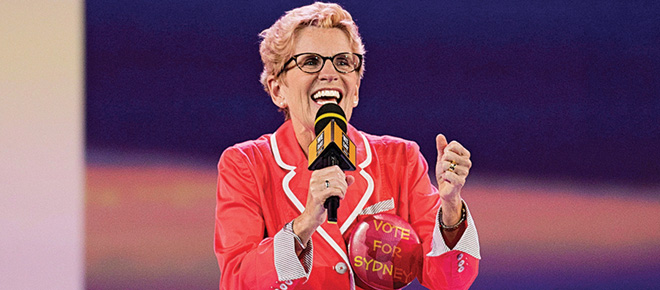Why don’t more women enter politics?
Emma Teitel on the political landscape of Canada
Share

Why don’t more women enter politics? Some blame institutionalized sexism, the demands of motherhood and uncompromising employers. Many researchers blame what they call the “historical hangover”: old societal attitudes that linger despite modern progressive ones. Ontario Premier Kathleen Wynne blames something else: poison. “It may be,” says Wynne, “that they don’t want to put themselves in that toxic environment, where people are ripping each other apart.”
I spoke with the premier this past weekend after her keynote speech at the YWCA Leadership Summit for Women in Hamilton which took place on the campus of McMaster University. For someone who was describing the toxicity of politics, she looked remarkably composed. By toxic, Wynne explained, she meant personal attacks on the floor and negative campaign strategies (not snarky remarks about her pantsuits, which she says she takes in stride). But why are men apparently less put off by this so-called toxicity than women? “Because the environment was created by men,” said Wynne. “I’m not saying that in a malicious way.”
To illustrate her point, she told a story about a male colleague literally cheering when the provincial Liberals won an “absolutely inconsequential vote” on what she called “some ridiculous procedural thing.” “It’s a real distinguishing feature between men as a group and women as a group: women want a substantive win and they want to make the right decision. Men want to win a tiddlywinks game.” But it’s that serious-about-tiddlywinks attitude, she suggested, that fuelled party politics and the desire to win, sentiments with which she is, to a large degree, sympathetic. “I just love boys,” she said with a smile.
Lovable boys may be, but, Wynne agrees, the political landscape of Canada from a gender perspective is still less than ideal. More than 87 per cent of Canadians are served by female provincial premiers, yet men outnumber women four to one in Canada’s federal Parliament. In this country, it seems, women rule from on high, but seldom from the middle, or below—a reality that puzzles political scientists and politicians alike. And the solution probably lies beyond the classic panaceas of quotas and the passage of time. Studies show not only that women (Canadian women especially) know less about politics than men, they are also—as Facebook COO Sheryl Sandberg notes in her bestseller Lean In—judged negatively where men aren’t. Ambition, for example, is often seen as virtuous in men and suspect in women; so too is confidence, mouthiness and stubbornness. And yet we need those things to succeed. So what’s a girl to do? Her only option, it appears, is a Catch-22: Stay quiet and avoid unfair judgment or speak out and risk being judged unfairly.
Wynne thinks there’s a third option, one that has yet to materialize: the establishment of a new political culture as robust as the old male-dominated one used to be, but informed by co-operation between the sexes. She attributes the current nastiness of Canadian political rhetoric, surprisingly, not to the classic “scotch and cigars” old boys’ club, but to the impersonal void left in the wake of that culture’s erosion. “What the retired [male] politicians say is, ‘We got along better then because we knew each other better, we drank scotch together.’ ” She doesn’t dismiss this observation, or see it necessarily as a negative. “We’ve lost that as a political entity and it hasn’t been replaced by a collegiality fostered by men and women equally.” (Bowling, maybe?)
In fact, although she clearly values feminism as a positive in the lives of women, Wynne agrees that a narrow focus on solidarity in the women’s movement can stifle original thought. It’s one of the reasons she left academia (she recalls a heated debate in a women’s studies class with another woman who chastised her for not attending a protest). “I think it’s been a problem for years,” she says.
Perhaps it would be best, then, if as an experiment, we ditched the sisterhood and went our own separate ways for a while. That’s the conclusion I’d been toying with, even before I met the premier, in another conference workshop called “Raising the generation of tomorrow’s women leaders.” The discussion was uniformly well-meaning; everyone was lovely, including the event’s instructor; the conversation was polite and impassioned. Unfortunately, though, it touched on everything but raising the generation of tomorrow’s women leaders. Instead we discussed the tyranny of pink, unintentional racism and, especially, the profound inappropriateness of complimenting one another’s clothing in the workplace. The irony was palpable. There we were, young mothers and sisters, enraged at a sexist society in which women are afraid to stand out or stir the pot—and there wasn’t a single dissenting voice among us. Except for one. On her way out of the room at the end of the workshop, a high school student named Ashley walked over to where I was still sitting taking notes, leaned over and said, “I love what you’re wearing.”
There is hope yet. Ashley for prime minister.
Have a comment to share? [email protected]